Jake Sanders, Editor
Upmann cigars, a name synonymous with premium craftsmanship and rich flavor, have a storied history that intertwines with notable events in global history, including connections to German espionage during World War II. This article delves into the origins of Upmann cigars, their evolution over the decades, and their unexpected ties to clandestine activities.
Origins in Cuba
The Upmann cigar brand traces its roots back to 1844 when German expatriate Hermann Upmann established a small cigar factory in Havana, Cuba. Upmann, an aficionado of fine tobacco, quickly gained a reputation for producing high-quality cigars. His dedication to craftsmanship attracted a loyal clientele, and the brand began to flourish.
By the late 1800s, Upmann cigars were being exported to various markets, including the United States and Europe. The brand became particularly popular among the elite, who appreciated the smooth, rich flavors that characterized the cigars. The company thrived through the years, weathering political changes and economic challenges in Cuba.
The Golden Age of Cigars
The early 20th century marked a golden age for cigars, with Upmann at the forefront. The brand expanded its offerings, introducing various lines that catered to different tastes. The 1920s and 1930s saw Uppman cigars gaining further prominence, with the brand becoming a staple in cigar lounges and social gatherings.
However, the onset of World War II brought significant changes not only to the cigar industry but also to the geopolitical landscape. During this tumultuous period, cigar production faced numerous challenges due to resource shortages and shifting market demands.
German Espionage Connections
Amidst the war, Upmann cigars found themselves at the center of a web of intrigue. Reports have emerged suggesting that the brand was indirectly linked to German espionage activities. As the war escalated, the German government sought ways to gather intelligence and infiltrate enemy lines, including the United States.
Cigars were often used as a means of communication and bribery among spies. It is believed that Upmann cigars, due to their esteemed reputation, were favored by operatives who sought to gain favor with influential individuals. Some historians suggest that Upmann cigars may have been used as gifts to facilitate connections or gather information.
Moreover, the brand’s German origins may have made it a target for suspicion in the United States during the war years. As anti-German sentiment surged, many businesses with German ties faced scrutiny. Upmann cigars, despite their established quality, had to navigate a complex landscape of loyalty and suspicion.
Post-War Revival
After World War II, the cigar industry experienced a revival, and Upmann was no exception. The company re-established itself as a leading brand, focusing on quality and innovation. The Cuban Revolution in 1959 posed new challenges, leading to the nationalization of the cigar industry. Many brands, including Upmann, had to adapt to the changing political climate.
In the late 20th century, Upmann cigars underwent a transformation, with production moving to the Dominican Republic. This shift allowed the brand to maintain its quality while adapting to new markets. The brand continued to innovate, introducing new blends and styles that appealed to a broader audience.
A Modern Legacy
Today, Upmann cigars are celebrated for their legacy of quality and craftsmanship. The brand has successfully navigated the complexities of the cigar industry, adapting to new consumer preferences while honoring its storied past. The connection to espionage, while intriguing, remains a footnote in the broader narrative of the brand’s history.
As cigar enthusiasts continue to enjoy Upmann cigars, they partake in a tradition that has roots in 19th-century Cuba and echoes through the tumultuous events of the 20th century. The brand stands not only as a symbol of fine tobacco but also as a testament to resilience and adaptation in the face of global challenges.



